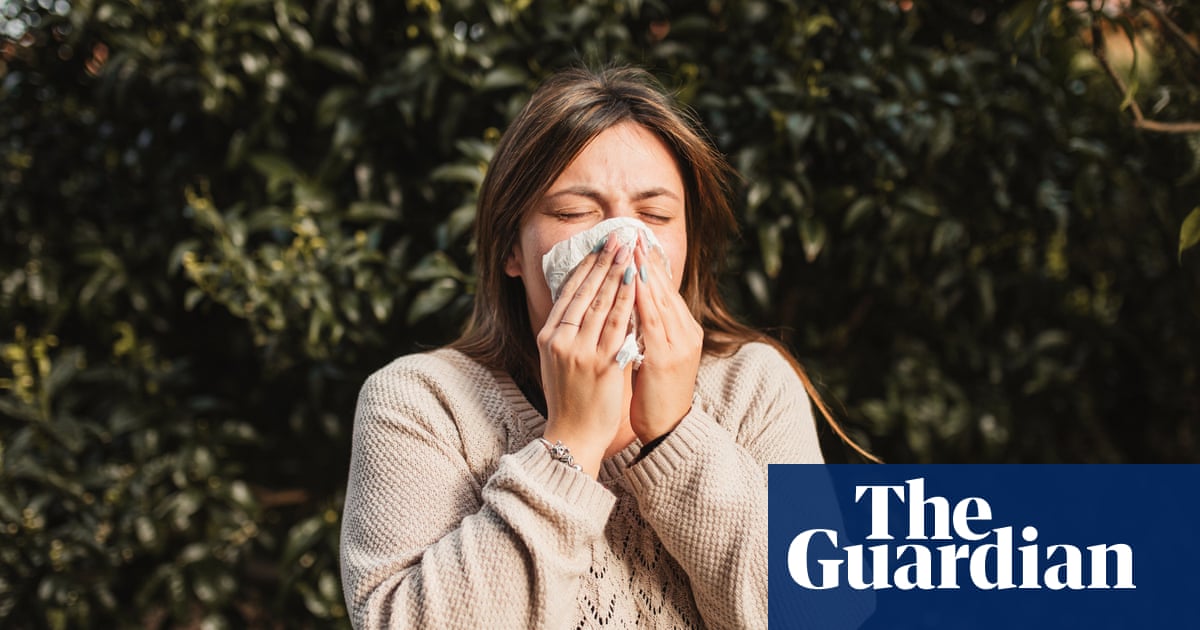Allergyseason is always rough, and it has only been getting worse.
Warming global temperatures and an increasing number of extreme weather events have made the pollen season in North America20 days longerthan it was in 1990, according to one 2021 study.
“Pollen seasons are effectively year-round in some parts of the country,” says Melanie Carver, the chief mission officer at the Asthma and Allergy Foundation of America.
In the US and UK, seasonal allergies – also known as allergic rhinitis orhay fever– are usually triggered by tree pollen in the spring, grass pollen in the summer and weed pollen in the fall. About 26% of adults in both countries have a seasonal allergy, as do about 19% of children inthe USand 10-15% of children inthe UK.
As pollen seasons continue to get longer and more severe, how does one best manage allergies? We asked experts.
Common symptoms of pollen allergies include itchy, watery eyes, an itchy and runny nose, sneezing, nasal congestion and/or post-nasal drip (when mucus runs from the back of your nose down the throat), headaches, sore throat, coughing, wheezing and trouble breathing, says Dr Arveen Bhasin, an allergist-immunologist at the Mayo Clinic in Jacksonville, Florida.
It’s possible to develop allergies at any time.
“It’s not uncommon for adults that have never experienced them before to find themselves managing seasonal allergies for the first time later in life,” says Carver.
Moving to a new environment and encountering different foliage can trigger pollen allergies. It usually takes two years to develop sensitivities to particular allergens, says Dr Payel Gupta, a spokesperson for the American College of Allergy, Asthma and Immunology, and the medical director for allergy and immunology at Tono Health.
A number of over-the-counter medications can help manage allergy symptoms, says Bhasin. These include decongestants, antihistamine pills, nasal sprays and eye drops.
In order for these medications to work, says Bhasin, you have to be proactive and start your regimen at least two weeks before pollen season.
Bhasin notes that antihistamines can lose efficacy over time. If a medication “is not consistently controlling symptoms”, you “may have developed tolerance” to it, she says.
Additionally, nasal sprays need to be used regularly to be of any help. Bhasin says she often sees patients discontinue using nasal sprays after three to five days because they don’t seem to be working, but it takes 10-14 days of consistent use for these sprays to reach maximum efficacy.
Experts caution that when overused, decongestants can cause a rebound effect, where nasal congestionworsens. “Do not use them for more than three days,” says Carver, and check with your doctor before using if you have high blood pressure, heart disease, thyroid disease, glaucoma or trouble urinating.
Sign up toWell Actually
Practical advice, expert insights and answers to your questions about how to live a good life
after newsletter promotion
“I really don’t understand why [decongestants] are over the counter, but they are,” says Gupta. “So people have to be careful.”
Lifestyle changes can reduce your exposure to pollen.
Inflammation and irritation are caused by pollen sitting on the surface of your skin or inside your nose and eyes, explains Gupta.
People spend as much as 90% of their time indoors, so it’s important to be mindful of how much pollen you are bringing inside, says Carver. At home, keep windows closed and the air conditioning running so that clean air can circulate. Make sure to regularly change air filters as well. When pollen counts are especially high, Carver suggests wearing a mask outside. And always remove your shoes, shower and change into a fresh set of clothes when you get home, experts say.
Air purifiersare also helpful, says Gupta, but getting one that is the right size for your space is important. The strength of a purifier is based on the square footage of a room, she explains.
If you have tried all the above and are still struggling with allergy symptoms, see an allergist.
“There are so many ways we can help you feel more comfortable,” says Gupta.
When over-the-counter drugs are not helping, allergists may prescribe allergy immunotherapy, meaning allergy shots or sublingual treatment (medicated drops that go under the tongue). These can help with longer-term control and relief, says Carter.
